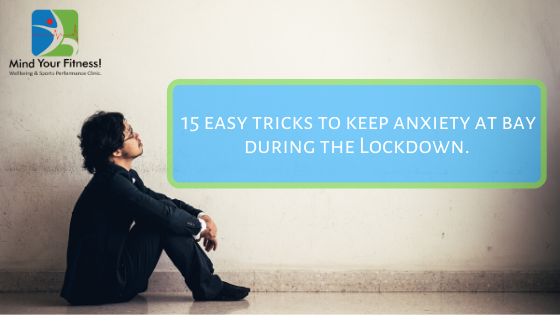
Today you live in a surreal world where you wake up to a day with no fixed routines and very limited contact with others. With lockdown in place, everything around us is changing rapidly and it is hard not to worry because of the uncertainty in your life. Humans like to think ahead and plan but this is not possible at the moment.
Anxiety can be contagious too. With people having a lot of time on their hands, you are being flooded with information on the pandemic from reliable as well as unreliable sources.
There are a hundred different remedies being circulated on various chat groups. All this information seems to heighten your senses and creates a feeling of uneasiness. This can be seen as physical symptoms like muscle tension or aches and pains, an inability to relax, difficulty concentrating, difficulty sleeping and feeling easily fatigued.The first and simple step with anxiety is to identify whether it is a real problem or a hypothetical one.
A real problem would be something like “ I have to go out to get essentials I must remember not to touch any surface or touch my face.” This is a natural anxiety and it will help you to remain safe.
A hypothetical problem would be imagining a worst case scenario like “what if my essentials get over and the shops have no stock or are not open?” This can leave you exhausted, upset and demoralised.
Management:
Start by asking yourself can I solve this problem? If the answer is YES, you know what to do. If the answer is NO, then it’s best to let it go. The catch is to avoid “what if” thoughts. A traditional cognitive behavioural therapy technique for working with negative, anxious, or upsetting thoughts is to write them down and find a different way of responding to them.
Here are some productive things you can do to ease anxiety:
- 1. Keep in touch by making calls and talking to people especially video calls this reduces the feeling of social isolation.
- 2. Care and share eg. If you have aged neighbours who can’t step out, help them with their essentials when you step out to pick up yours. These acts of kindness can be very satisfying.
- 3. There are so many online courses available you should upgrade your skills or develop a new skill; something you have always wanted to but never had the time for.
- 4. Listen to Podcasts and TED talks on topics that you enjoy and have nothing to do with the pandemic.
- 5. Each of us dances to a different tune so spend some time connecting with yourself, daydream, meditate, pray, breathe mindfully, practice yoga.
- 6. Revive hobbies that have taken a backseat.
- 7. Make a bucket list of things you want to do when this is over.
- 8. Spend time grooming yourself eg do your nails, put on a face pack.
- 9. Besides cleaning the house you could check around to see if a light bulb needs changing or a wardrobe needs to be rearranged.
- 10. You could have a gratitude journal which you fill out everyday or make it a family activity where at the end of each day, you express gratitude for something you are grateful for.
- 11. Pull out those board games which you haven’t used in ages and have some fun.
- 12. Set a routine for yourself. Maintain a regular time for waking up and going to bed, eating at regular times, and setting a schedule of activities daily. This could help give structure to your day. It will also help you bounce back when things normalise.
- 13. Try and limit your social media time to reduce anxiety triggers and turn to reliable sources like reputed news agencies, your state or national health department and the World Health Organization for information.
- 14. Eat nutritious food, exercise, maintain physical hygiene, wash your hands regularly and stay positive. This will help strengthen your immune system.
- 15. Last but not least you need to keep reminding yourself that this is a temporary phase.
I’d like to end by saying that keeping your mind open and accepting the change that is taking place in your life can help you feel more in control.
Sujatha Kumar, Clinical Psychologist, Mind Your Fitness!




